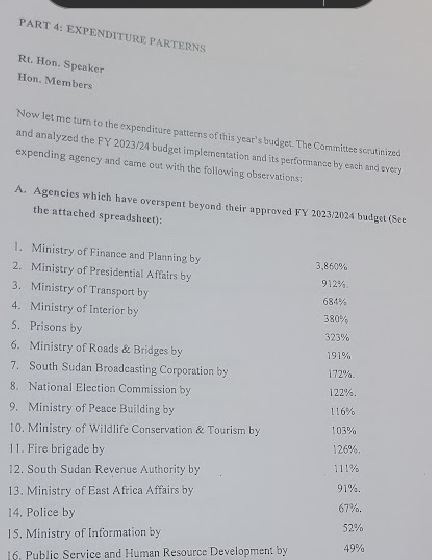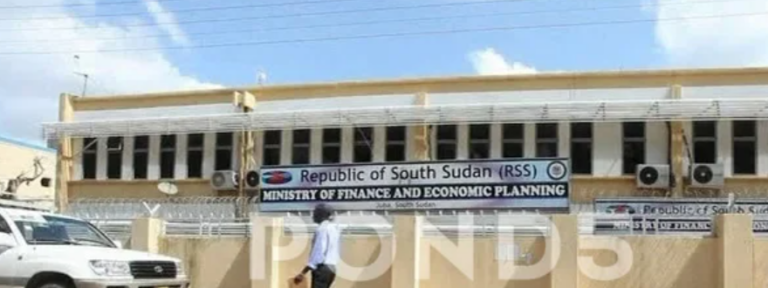The Transitional National Legislative Assembly (TNLA) on Tuesday revealed that 21 government ministries, departments, and agencies exceeded their approved budgets for the 2023/2024 Financial Year.
The highest overspending was by the Ministry of Finance and Planning, which surpassed its budget by an astonishing 3,860 percent, while the Ministry of Foreign Affairs and International Cooperation had the smallest overspending with 6 percent.
Other agencies that significantly overspent include the Ministry of Presidential Affairs (912 percent), the Ministry of Transport (684 percent), the Ministry of Interior (380 percent), and the Prisons Service (323 percent). In contrast, some ministries slightly exceeded their budgets, such as the Ministry of Wildlife Conservation and Tourism (103 percent), the Fire Brigade (126% percent), and the Ministry of Foreign Affairs (6 percent).
The South Sudan Broadcasting Corporation (SSBC) and the National Election Commission (NEC) were also named among the institutions responsible for overspending.
In addition, seven states and three administrative areas were found to have exceeded their allocated budgets, with Upper Nile State leading at 117 percent, followed by Greater Pibor Administrative Area at 90 percent. Meanwhile, Western Equatoria State had the smallest overspending at just 1 percent.
This was revealed by the parliamentary committee on finance and planning during the second reading of the national budget in Juba, where, Nathaniel Oyet, the First Deputy Speaker of the TNLA, condemned the overspending, labeling it a “financial crime.”
“There was over-expenditure on the previous budgets by some privileged ministries, privileged states, and government institutions. And the leading culprit in this over expenditure is the finance ministry overspending with over 3,860 percent,” he said. “I thought the Ministry of Finance was a treasurer keeping the resources on behalf of the government and the people of South Sudan. On that budget approved, you pay Caesar what belongs to Caesar and give God what belongs to God, referring to the fact that each ministry is supposed to receive its approved portion.”
This came after the finance committee, during a public hearing, revealed that in the fiscal year 2023/2025, the country surpassed its projected revenue and yet failed to pay civil servants and organized forces.
Oyet questioned why some ministries were allowed to spend more than their approved budgets.
“The Ministry of Finance has turned out to be an implementing agency on behalf of other ministries. I do not know if they have constructed roads, hospitals, or built schools,” he said. “This over-expenditure deprived other institutions of their rightful allocation.”
The TNLA deputy speaker the overspending not only deprived ministries of their allocations but also civil servants of their pay and citizens of basic services.
Despite other ministries exceeding their budgets, some claim they only received advanced pay cheques but could not cash out the money.
Meanwhile, Parliamentary Affairs Minister Mary Nawai said her ministry only received a cheque but could not receive the money. She said she still had the cheque.





